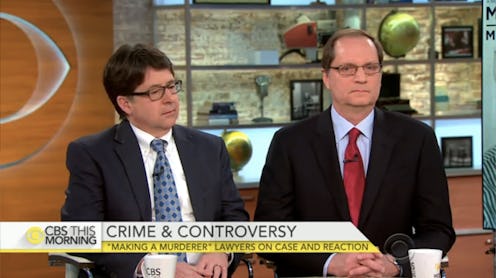News
Steven Avery's Lawyers Made A Surprising Reveal

On Friday morning, two of the central figures from one of the biggest Netflix original series successes went on a network morning show to talk about the whole experience. And this particular lawyerly duo probably had their fair share of admirers tuning in: Steven Avery's former lawyers Dean Strang and Jerry Buting admitted on CBS This Morning that they aren't absolutely positive of the innocence of Making a Murderer's central figure.
They did not, however, show any apprehensions or regrets about their impassioned defense and ongoing advocacy for Avery, which has dramatically elevated both his and their profiles since the documentary's release in December. The series implicitly argues that Avery's 2006 conviction, for the murder of 25-year-old Wisconsin photographer Teresa Halbach, was wrongful, and at the very least influenced by police misconduct and conflict of interest, up to and including the use of planted evidence at trial (the central players on the prosecution's side, foremost among them former Calumet County district attorney Ken Kratz, have denied and denounced these allegations).
Rather, they portrayed this natural human doubt as kind of the entire point ― juries are supposed to acquit in the event of reasonable doubt, and to Strang and Buting's mind, there was plenty in Avery's case. When CBS This Morning cohost Gayle King asked the pair if they were "convinced of [Avery's] innocence," Strang made it clear that they didn't have to be to have legitimate concerns about his case.
When King put the question to Strang, he replied that he was "not convinced of his guilt. I'm not at all convinced of his guilt, never have been." When the question was posed again, while pointing out that having doubts about someone's guilt is different from having doubts about someone's innocence, Strang conceded that he couldn't be sure Avery didn't commit the crime ― but that uncertainty is itself the point.
Sure, absolutely. And if it was okay to convict people on maybes, I wouldn't be worried about this. But it's not.
Strang and Buting also ran down some of the most frequent criticisms of the documentary that have arisen since its release, including the aforementioned Ken Kratz's insistence that key evidence was omitted from the documentary, including a trio of phone calls placed from Avery to Halbach the day she disappeared, and the presence of Avery's DNA under the hood of Halbach's car. Buting specifically tackled both points, first characterizing the phone call issue as the state trying to make some things look "more sinister than they really were."
It's nonsense to say that large parts of the state's case were left out. With regard to this, for instance, also left out was the fact that he called and made an appointment to the office. If he had his cell phone number and was trying to lure her, why would you call the office, and create a paper trail? He'd just call her directly, and no one ever would know that she had come there. Instead, he goes through the office.
Buting was also asked about the prosecution's claim that DNA was found under Avery's hood ― in reality, as he noted in his reply, Kratz has publicly insisted that Avery's "sweat DNA" was discovered.
First of all, the prosecutor has said that "sweat DNA," quote unquote, sweat DNA is found on the hood, and there's no such thing as sweat DNA, or perspiration DNA, it's just DNA. Where it comes from, they can't tell.
Needless to say, it'll be fascinating to see if this case gets a fresh look in court thanks to all this additional exposure, which could increase the likelihood of some new evidence arising ― on Wednesday, as The New York Times detailed, Avery filed motions for an appeal, represented by his new defense attorney, Kathleen Zellner.
Image: Making a Murderer/Netflix; CBS